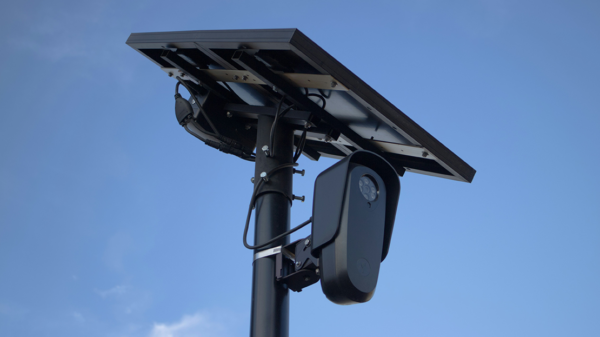Automated License Plate Readers 101
ALPRs are mass surveillance tools. They are computer-controlled cameras that automatically capture all license plates (and more) that come into view, store that data (including the time, date, and location of the scan), and allow it to be compared to external watch lists and databases, some of which may not be accurately maintained. Over time, ALPRs function like a location tracker the government places on your car to monitor your movements—just in case you do something of interest to them.
Increasingly and unfortunately, because of the rise of ALPR companies like Flock Safety, this means your stored ALPR data can be accessed and searched for virtually any reason at all by law enforcement officers across the country. These AI-enabled systems allow police to instantly track where you’ve been and attempt to find out where you likely are now.
The number of ALPRs in Iowa is increasing rapidly. At the same time, their capability for surveillance is expanding. Your privacy is at stake.
Privacy isn’t just about using passwords on your accounts: it’s about the ability to decide what parts of your life are known to the public and the government, and what parts are known only to you or to friends and family.
Privacy isn’t about protecting people who do something wrong; it’s about protecting all people who don’t want every detail of their lives to be public.
It is a core principle that our government does not invade people’s privacy and collect information about citizens’ activities, just in case they do something of interest to them. In fact, this type of “just in case” information collection would essentially treat every person in America like a potential criminal suspect.
The 4th Amendment of the U.S. Constitution protects us all from “unreasonable searches and seizures” by the government and guarantees "the right of the people to be secure in their persons, houses, papers, and effects." This means the government needs permission, based on probable cause and individualized suspicion, not only to search your home but also to monitor the data we all produce constantly and mostly involuntarily, like your cell phone location data.
Our digital footprint is constantly expanding, containing data about the most intimate aspects of our lives. This includes our communications, whereabouts, searches, etc. When the government has easy access to this information, we—and the people we care about—lose more than just privacy and control over our information. Free speech, security, and equality suffer as well.
The rapid growth of surveillance technologies has outpaced the regulations and safeguards that govern them, if they exist at all. This means the potential for privacy violations (and worse) is significant. Companies and government agencies are deploying new privacy-invasive tech before the public is even aware it exists and certainly before we’ve knowingly consented.
No. Automated traffic enforcement cameras are triggered by a specific violation (i.e. you’re speeding or run a red light). ALPRs aren’t triggered by you doing something wrong. They track your movements any time they see you.
An ALPR can scan hundreds of license plates in a single minute and check them against “hot lists,” which are databases that track everything from stolen vehicles to missing persons to anyone law enforcement chooses, frequently without oversight, to put into a database. These hot lists include databases like the FBI’s National Crime Information Center, which is specifically exempted from federal accuracy and reliability requirements.
After scanning your license plate, an ALPR system then feeds and stores this data into a central database. In the case of Flock Safety, its database can then be searched (without a warrant) by any law enforcement officer in the nation whose government or agency is a customer of Flock (and even ones that aren’t).
This rapidly growing network of ALPRs, especially the ones operated by Flock, gives the government and a private company unprecedented power to track your every move.
While license plate readers have been around for some time, the private company Flock Safety is the first to create a nationwide mass-surveillance database out of its customers’ ALPR data. This means a Flock customer in Texas or New York can access ALPR data from Iowa—and can even do so on behalf of a non-Flock customer like Immigration and Customs Enforcement. In Iowa, Flock’s ALPR systems account for the vast majority of contracts.
While ALPRs have been around for a while, they have grown immensely in number and capability over the past few years. Much of this growth is due to Flock Safety. Flock has been approaching Iowa’s cities to pitch ALPRs, trying to convince city officials to track their own constituents (while glossing over the fact that every Flock customer will have that same ability).
Typically, a company like Flock approaches a police department to market the system. The police department then signs a standard Flock contract allowing for the placement of cameras in the city and permitting access to Flock’s central database, which is reciprocal with other Flock customers. The price a city pays varies based on the number of cameras, the type of surveillance, etc. Often, the contracts are signed without city council approval or input from the community.
ALPRs pose a significant threat to privacy because amassing data on vehicle locations can reveal very private details about our lives (like doctor visits, where we sleep at night, what religious institutions we attend, and what protests we participate in). Very few safeguards exist to protect us against inappropriate uses and ALPR data access.
Flock’s nationwide data sharing system has made local ALPR data available to virtually any law enforcement officer who wishes to access it throughout the nation—without a warrant or public knowledge. There have been numerous documented incidences of abuse and misuse of the Flock system, resulting in threats to civil rights and civil liberties.
For more information, check out the ACLU of Iowa’s Protect Our Privacy: Stop Government Surveillance campaign.


